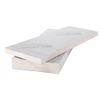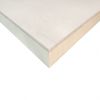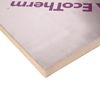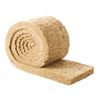In the Spring of 2022, the government released a statement about VAT on energy-saving materials.
The burning question is:
Is insulation 0% VAT?
You bet! The announcement said that energy-saving materials, such as insulation, will have a 0% VAT rating when installed by a contractor between then and 31 March 2017.
So, what does this mean?
This means, on a sale-on-goods-only basis, the tax will continue to be standard-rated as it is now. In future, it will be the responsibility of the installer or contractor to charge the appropriate rate once the changes come into effect.
With that in mind, let’s find out more about how zero-rate VAT on insulation is going to affect you.
Table of contents
- What is the value added tax (installation of energy-saving materials) order 2022?
- What are energy-saving materials?
- Why should we insulate our homes and businesses?
- Where can I buy insulation?
What is the value added tax (installation of energy-saving materials) order 2022?

This measure introduced a time-limited zero-rate VAT for the installation of certain energy-saving materials (ESMs). It also reversed Court of Justice of the European Union-derived legislative changes introduced in 2019. These changes narrowed the scope of the previous relief, affecting installations in residential accommodations in Great Britain.
This measure is permanent. It removes the social policy conditions and the 60% test businesses had to consider. This test determined the VAT liability of ESM (energy-saving materials) installations before the changes.
So now, this new measure brings wind and water turbines back into the scope of the relief.
The list of qualifying goods and rate of VAT due on installations in Northern Ireland will remain unchanged. Instead, the Northern Ireland Executive will receive a Barnett share of the value of the relief. This will be in effect until it can be introduced UK-wide.
Am I affected by the value added tax order (2022)?
You will be affected by the value added tax order for energy-saving materials if:
- You are a business providing and installing energy-saving materials (ESMs) or;
- A customer who has the ESMs installed in England, Wales and Scotland.
How long is the zero-rate VAT applicable?
The temporary zero rate will be available for a five-year period. Once that period has ended, it will revert to the 5% reduced rate of VAT.
The latest update to the Energy-saving materials and heating equipment (VAT Notice 708/6) document, issued on 31 January 2024, confirmed the end date of this measure to be 31st March 2027. So, you have more than enough time to take full advantage of the massive befeits.
What are energy-saving materials?
There are many diverse types of energy-saving materials:
- Controls for central heating and hot water systems
- Draught stripping (weatherstrips)
- Insulation
- Solar panels
- Ground source heat pumps
- Micro combined heat and power units
- Wood-fuelled boilers

As you can see, insulation is just one of many, referring to materials designed and installed because of their insulating qualities. So, this could be insulation for:
- Walls
- Floors
- Ceilings
- Roofs or lofts
- Water tanks
- Pipes or other plumbing fittings
Please note: The zero or reduced rate does not apply to products like curtains and carpets. This is because they are not typically installed as insulation.
But what happens if you’re having energy-saving materials installed with other works?
Here’s a quick example:
Say you’re installing loft insulation in a residential setting and need to create a new loft hatch for better access. In this scenario, the cutting of the hatch is considered secondary to the insulation installation. This is because the hatch cutting is done solely to facilitate the primary service of installing insulation, rather than being a standalone service.
As a result, the entire service qualifies for the energy-saving materials relief. However, if the hatch cutting service were provided independently, it would be subject to standard-rated taxation.
Why should we insulate our homes and businesses?
All properties lose heat through the building fabric. The challenge is to reduce this as much as possible. That means roofs, floors and walls all need attention – and insulation.

Insulation materials will play an important part in compliance with the latest changes to Part L of the Building Regulations and in helping homeowners save money on their energy bills.
You can measure the thermal performance of insulation by the U-values they can achieve. In general, the lower the U-value, the more heat is retained. This can make a dramatic difference in energy costs, as a well-insulated home will need less heating.
It can also make a difference to the environment. This is because more energy-efficient properties will have a much smaller carbon footprint.
You can learn more about U-values via our U-value guide.
Where can I buy insulation?
Right here at Insulation Superstore! We offer an extensive range of insulation products. This includes a variety of types and materials for an array of applications and budgets.
Choose from traditional insulation boards and slabs to versatile multi-foil products and solutions. All are designed to provide more benefits, such as fire protection and acoustic soundproofing.
We also stock products to insulate floors, walls, ceilings and roof space. Our team are also on hand to help customers find the most suitable type of insulation for their project. Complete with installation advice if needed.

Are you a professional contractor working on a large project? A DIYer looking to save energy (and some money) by doing the work yourself? Whatever your background, we can help at every stage.




















